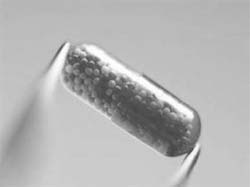
The 282nd session of Xiangshan Science Conferences entitled "Basic Research on the Efficacy of Macromolecular Drugs" was attended by 40-odd scientists recently in Beijing.
The conference was co-chaired by WANG Jingkang of Tianjin University, ZHEN Yongsu with the Institute of Medical Biotechnology under the Chinese Academy of Medical Sciences, YANG Zhimin from the University of Michigan and ZHANG Zhirong from West China School of Pharmacy, Sichuan University.
Macromolecules (peptide hormones, proteins, antibodies, substitutive enzymes and so on) are of high significance in treating some of the key diseases such as cancer and HIV. Their unparalleled strengths compared with small molecular drugs, according to Yang, lie in the high selectivity, the excellent curative effect, the repeatable pharmacological action as well as the convenience of biochemical mass production. Up to now, the development of macromolecular drugs (MMD) has already become a major task for researchers and pharmacologists all over the world.
In his keynote speech "Efficiency Optimization of Macromolecular Drugs: Significances and Prospects," Yang also listed the bottlenecks scientists are facing today for MMD development. The drug delivery system remains a major problem, for instance when penetrating cell membranes or solid tumors. Also, the complex molecular structures of MMD make it difficult for scientists to identify their crystal and conformation polymorphs.
Yang pointed out that in order to optimize the effects of MMD, scientists shall on one hand highlight the study, design and construction of MMD delivery system, while on the other hand, they must pay enough attention to the particular properties of the drugs according to their unique molecular structures. For instance, there have been numerous reports on the invalidation or deficient release of the hormones which are polymerized with their carriers such as PLGA and PLA. Further research is needed for the purification and separation process as some MMD tend to interact with the solvent.
Six other scholars gave speeches on different aspects of contemporary MMD study and hot discussions were carried out by all participants of the conference.
The scientists suggested the R&D of MMD be listed in the National Basic Research Program of China for a stronger governmental support in funding and policy. They also called for the establishment of a standard system for MMD examination and approval as soon as possible. Consensus was reached that an interdisciplinary and international research group will largely promote the MMD studies in China.







